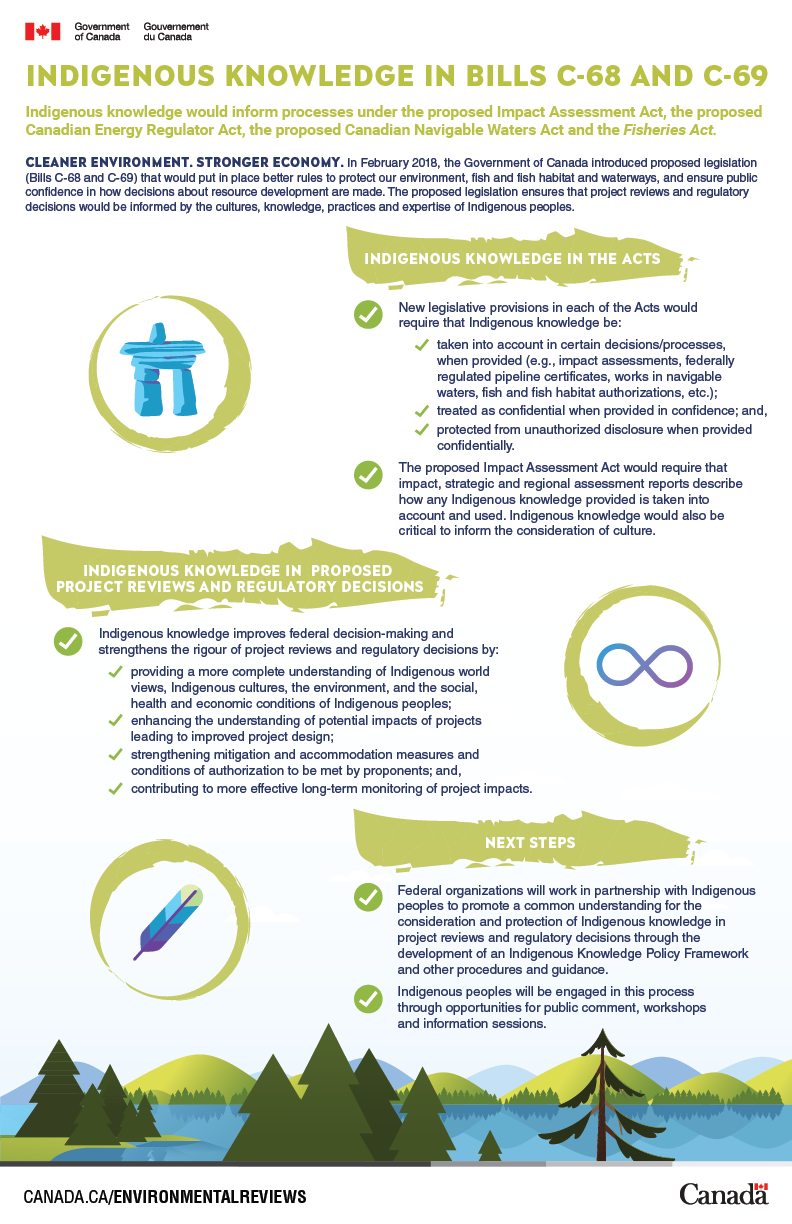Indigenous Knowledge in Bills C-68 and C-69

Long description
Indigenous knowledge would inform processes under the proposed Impact Assessment Act, the proposed Canadian Energy Regulator Act, the proposed Canadian Navigable Waters Act and the Fisheries Act.
CLEANER ENVIRONMENT. STRONGER ECONOMY. In February 2018, the Government of Canada introduced proposed legislation (Bills C-68 and C-69) that would put in place better rules to protect our environment, fish and fish habitat and waterways, and ensure public confidence rebuild public trust in how decisions about resource development are made. The proposed legislation ensures that project reviews and regulatory decisions would be informed by the cultures, knowledge, practices and expertise of Indigenous peoples.
Indigenous knowledge in the acts
- New legislative provisions in each of the Acts would require that Indigenous knowledge be:
- taken into account in certain decisions/processes, when provided (e.g., impact assessments, federally regulated pipeline certificates, works in navigable waters, fish and fish habitat authorizations, etc.);
- treated as confidential when provided in confidence; and,
- protected from unauthorized disclosure when provided confidentially.
- The proposed Impact Assessment Act would require that impact, strategic and regional assessment reports describe how any Indigenous knowledge provided is taken into account and used. Indigenous knowledge would also be critical to inform the consideration of culture.
The proposed Impact Assessment Act would require that impact, strategic and regional assessment reports describe how any Indigenous knowledge provided is taken into account and used. Indigenous knowledge would also be critical to inform the consideration of culture.
Indigenous knowledge in proposed project reviews and regulatory decisions
Indigenous knowledge improves federal decision-making and strengthens the rigour of project reviews and regulatory decisions by:
- providing a more complete understanding of Indigenous world views, Indigenous cultures, the environment, and the social, health and economic conditions of Indigenous peoples;
- enhancing the understanding of potential impacts of projects leading to improved project design;
- strengthening mitigation and accommodation measures and conditions of authorization to be met by proponents; and,
- contributing to more effective long-term monitoring of project impacts.
Next steps
- Federal organizations will work in partnership with Indigenous peoples to promote a common understanding for the consideration and protection of Indigenous knowledge in project reviews and regulatory decisions through the development of an Indigenous Knowledge Policy Framework and other procedures and guidance.
- Indigenous peoples will be engaged in this process through opportunities for public comment, workshops and information sessions.